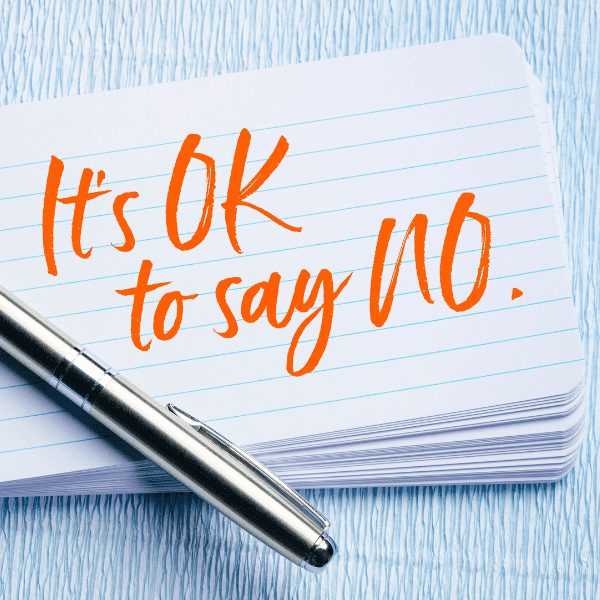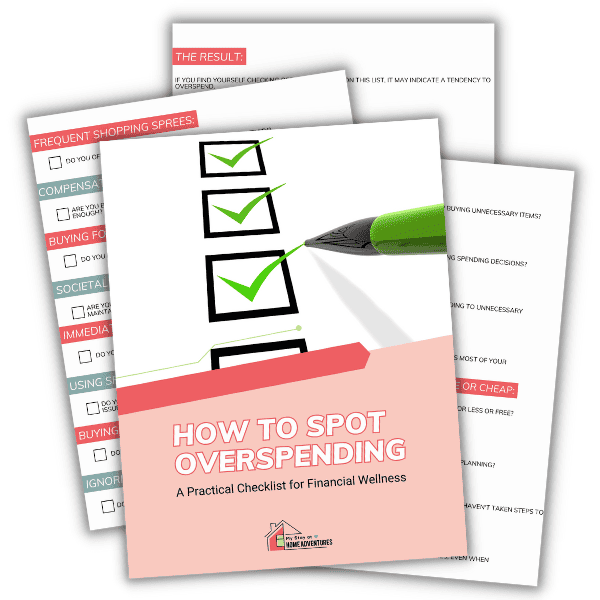12 Unbelievable Tips For Not Spending Money This 2024
This post may contain affiliate links which might earn us money. Please read my Disclosure and Privacy policies hereReady to take the reins of your financial future? Welcome to our comprehensive guide, packed with 12 actionable tips for not spending money in 2024. We delve into the psychology of overspending and offer practical strategies to help you save. Plus below there's a free pdf checklist, but more about this later.
Whether you're seeking to establish a budget, define spending limits, or uncover clever saving methods, we've got you covered. Let's embark on this journey to financial stability together.
Although I could not specify the amount Americans overspent in 2023 since the year is not over. However, it's noted that nearly half of Americans (47%) overspend on food, according to the U.S. Bureau of Labor Statistics (source).
Also, only about a quarter (26%) of Americans reported overspending in 2022, suggesting a similar or slightly increased rate for 2023, given the continued consumer spending (source).
I would need to do more research or look at detailed financial reports to get more accurate numbers for 2023.
Now, let's discover how these tips can transform your approach to money and set you on the path to savings success!

Why do we overspend money?
Overspending money is a common issue many face, often rooted in deeper emotional and psychological factors. One key reason is the influence of our childhood experiences. Those who grew up in lower-income households may find themselves overspending to compensate for their past scarcity.
It's a form of overcompensation, an attempt to create a sense of security that was lacking during their formative years. Similarly, spending money can provide a sense of power or control. The act of purchasing something new, whether needed or not, can make us feel more influential and successful in life.
Another significant factor contributing to overspending is the societal pressure to maintain a certain lifestyle. The desire to “keep up with the Joneses” can lead us to spend beyond our means just to avoid the perceived stigma of falling behind others in terms of material possessions.
Also, the lure of immediate gratification plays a substantial role. Buying new things to stay trendy or giving in to impulse purchases for momentary happiness are common examples of this.
Lastly, overspending can also serve as a distraction from dealing with underlying issues like stress, anxiety, or other unpleasant emotions. Instead of facing these problems head-on, some people might find temporary relief in retail therapy, leading to a cycle of overspending. Understanding these reasons can be the first step towards curbing overspending habits.
To summarize, we overspend money for many reasons:
- We were poor as kids.
- It gives us a sense of power.
- To maintain our lifestyle.
- For immediate gratification.
- To maintain an image.
- To avoid dealing with issues.
We can try several methods and strategies to overcome our tendency to overspend. Below is a table that includes some of the tips we will cover today:
| Tips | Description |
|---|---|
| Create a Budget | Keep track of your income and expenses to understand where your money is going. |
| Use Cash Instead of Credit | It's easier to keep track of spending when you physically hand over bills and coins rather than swiping a card. |
| Avoid Impulse Purchases | Try to wait at least 24 hours before purchasing non-essential items. This can help curb impulse buys. |
| Limit Eating Out | Preparing meals at home is usually cheaper than eating out. Try to limit dining out to special occasions. |
| Shop with a List | Stick to a list when grocery shopping to avoid buying items you don't need. |
| Track Your Spending | Regularly monitor your bank and credit card statements to identify areas where you can cut back. |
| Save Automatically | Set up automatic transfers from your checking account to your savings account to ensure you're regularly saving money. |
| Unsubscribe from Marketing Emails | These often lead to unnecessary purchases. Opt out to avoid temptation. |
| Practice Gratitude | Being thankful for what you already have can help curb the desire for new things. |
Let's dig deeper into controlling overspending with the twelve tips below. Remember that these tips are just suggestions, and you might not need to do all of these tips.

Start with a Budget
One of the most important things to do when trying to stop overspending is to create a budget and stick to it. This means carefully tracking your income and expenses, ensuring your spending does not exceed your income.
Shop with a list.
A helpful strategy for not spending money is creating a detailed shopping list before going to the store. This will help you stay focused and avoid impulse purchases that can lead to overspending.
Set goals
In order to stay motivated and on track with your financial goals, it can be helpful to set specific, measurable goals that you can work towards. For example, you might commit to saving a certain amount of money each month or to paying off a particular debt by a certain date.
Set a Limit
A key strategy for avoiding overspending is to set limits on your spending. Whether it’s a certain amount of money each week or a maximum dollar amount that you can spend in a given period, setting parameters and adhering to them can go a long way in helping you avoid overspending.
Avoid Deal Websites
One of the most important strategies for not spending money is to avoid deal websites and other sources of tempting deals and discounts. These sites often lead to impulse purchases and can derail your efforts at financial control. You can stay on track and achieve your financial goals in 2024 by simply avoiding these temptations.
Avoid Going Out for Leisure
Another great tip for not spending money is to avoid going out for leisure or entertainment. Instead, try exploring free or low-cost activities in your area, like hiking, walking around the city, or visiting local museums. Not only will this help you save money, but it can also be a fun and rewarding way to spend your time.
Avoid Temptation
Curbing your spending is to avoid temptation wherever possible. This might mean staying away from places you are likely to be tempted (such as expensive stores, flashy restaurants, and other high-end venues), unsubscribing from marketing emails and other promotions, or simply turning off the TV when commercials come on.
Find Ways to Save
One of the best ways to prevent yourself from overspending is to find ways to save money in other areas of your life. Whether it’s making small lifestyle changes, like carpooling or bringing leftovers for lunch, or looking for more substantial ways to cut costs, such as refinancing your mortgage or finding cheaper insurance options, there are many simple ways to save money that will help reduce the amount that you need to spend on unnecessary items.
Avoid Buying Items You Can Get For Free or cheap
A great way to avoid spending money in 2024 is to be mindful of the items you buy and to look for ways to get them for free or at a low cost. This might mean checking out thrift stores, taking advantage of free samples and giveaways, or even getting things for free from friends and family. By recognizing opportunities to get items you need for free or cheap, you can save money and keep on track with your financial goals.
Create a Meal Plan
Another useful strategy for not spending money is to create a detailed meal plan. This can help you save money by ensuring that you only buy and prepare the ingredients needed for your meals and by helping you stick to a budget when grocery shopping.
Analyze Bad Habits
Analyze your bad habits and work on breaking them. This might mean identifying the triggers that lead you to overspend, such as feeling stressed or anxious and finding other ways to deal with these other issues. It could also mean identifying your “weak spots,” such as shopping malls or online retailers, and avoiding these places when you are trying to control your spending.

Just Say No
Finally, one of the most important strategies for staying on track with your spending is to learn to say no. Whether declining that expensive dinner invitation or ignoring those persistent sales calls, you can take control of your finances by simply refusing to spend money when it is unnecessary. With these simple steps, you can stay on top of your financial goals and avoid overspending in 2024.

To successfully avoid overspending, it is essential to make smart financial decisions and cultivate good money-management habits. By avoiding temptation, finding ways to save, analyzing your bad habits, and just saying no when necessary, you can stay on track with your financial goals in 2024. Best of luck!

Free Overspending Checklist
Are you finding it hard to manage your spending habits? Here's something that might help. We have put together a resourceful guide called “How to Spot Overspending.” This handy three-page printable is filled with practical tips and strategies to help you identify and curb overspending.
It is based on the insightful topics we just covered. The best part? It's absolutely free!
All you need to do is subscribe. So why wait?
Subscribe today and get this valuable PDF delivered straight to your inbox. Make 2024 the year you take control of your finances!









These are great ideas, Joyce! And I’m happy to say that we’re doing a few of them already. Setting a budget wasn’t quite as difficult as I thought it would be.
When I started I was “copying” others budgeting style. It took a bit to find a budget that worked for us. Thank you Kori.